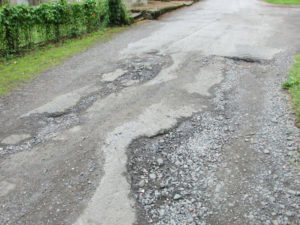The extreme state of disrepair of the English local road network will only be sorted by a ‘front-loaded’ five-year funding settlement.

So say MPs from the Transport Committee, adding the Government’s current short-term approach to financing road maintenance is not “not fit for purpose”.
The call comes in the Committee’s latest report, ‘Local roads funding and maintenance: filling the gap’, which says that local government revenue funding has fallen by about 25% since 2010 and with no ring-fencing for local roads funding, cash-strapped authorities have diverted the money to plug other gaps such as social care.
Lack of funding certainty has caused many councils to take short-term, reactive decisions on road maintenance, which is less effective than proactive maintenance and undermines local economic performance and results in direct costs to taxpayers, either through rising costs of deferred work or through a ‘mend and make do’ approach. It also damages vehicles and causes injuries to passengers, particularly those with existing medical conditions.
And such a set-up also “seriously compromises” the safety of other road users, especially cyclists.
The Committee warns that extracting a five-year settlement from the Treasury should not be an excuse to cut funding, and adds that the exact nature of the settlement should be developed following consultation with local authorities to ensure the funding is designed in a way that will be most useful for them. “It should encourage innovation, collaboration and good practice,” it continues.
And the Committee believes that the DfT should make it easier for the public to report road concerns and to access real-time updates on road conditions.
Chair of the Transport Committee, Lilian Greenwood MP, said: “Local authorities are in the invidious position of having to rob Peter to pay Paul. Cash-strapped councils are raiding their highways and transport budgets to fund core services. This is not an isolated example – it’s been a common thread in our other recent inquiries on buses and active travel. Now is the time for the Department to propose a front-loaded, long-term funding settlement to the Treasury as part of the forthcoming Spending Review.
“Almost every journey begins and ends on local roads: the DfT must work with the public and local authorities to make them safe.”
The report has been welcomed by the AA. Jack Cousens, head of roads policy, said: “Last week eight out of 10 (81%) drivers told us that potholes on local roads are causing problems, with more than half saying they are causing big problems (52%).
“Local councils have seen their budgets stretched and cut back for several years, and despite a good effort last year, ultimately they are losing the battle on potholes. According to the latest AIA Alarm survey, residential roads in England are resurfaced once every 99 years – a truly once in a lifetime situation!
“Currently it would take a decade to get our local roads back to where they should be, so a fully funded five-year project would go a long way towards smoothing out our streets.”
The Freight Transport Association welcomed the findings. Christopher Snelling, head of UK policy at the FTA, commented: “As the business organisation representing the logistics sector, FTA fully supports the Transport Select Committee’s calls for a five-year pothole repair fund; the road network has been subject to chronic underinvestment for many years. Taxes on UK road transport are the highest in Europe, yet our roads continue to be underfunded. Large potholes are an all too common sight – costing businesses in the logistics industry millions of pounds a year in vehicle repair and hire replacement.Potholes are dangerous to cyclists as well as damaging to vehicles; it is ridiculous that we still have this problem in today’s Britain.
“While this funding would play a vital role in improving the nation’s road network, it would not offer a complete solution; estimates show it would cost £9.7bn and take 10 years for highways departments in England and Wales to catch up on the road repairs needed. This investment must be viewed as part of a more comprehensive, long-term road improvement strategy.”

